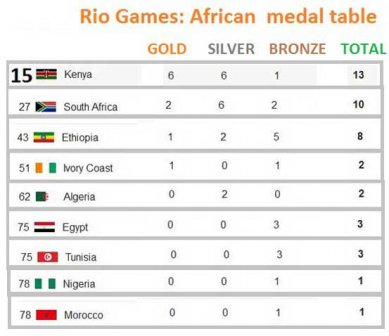The Olympics ended with a bang on Sunday night. Like all the other Olympic games before it, Rio 2016 would be remembered for the usual reasons; the new records set and the old ones broken, the opening and closing ceremonies, the legends we bade farewell and the new ones that were born during the games, dope and anti-doping, triumph and defeat, bloopers and showboating.
10 African countries won a total of 43 medals at the event. A breakdown of the medals table for African countries shows that Kenya (the only African nation in the global top 20) came tops in the continent with a total of 13 medals, with a haul of 6 Gold, 6 Silver and 1 bronze. South Africa placed second with 10 medals, 2 Gold, 6 Silver and 2 bronze. Ethiopia rounds off the list of the 3 best performing African countries at the Olympics with a win of 8 medals, 1 Gold, 2 Silver and 5 bronze.
The United States unsurprisingly led the overall medals table with their massive haul of 121 medals, winning an eye-popping 46 Gold, 37 Silver and 38 Bronze. The usual suspects, comprising of China, the UK, Russia, Germany and France made it to the top 10. The only notable difference this time, was the fact that the UK beat China to place second on the medals table after the United States.

The bulk of Africa’s medals came from its traditional strongholds in the athletics event. All of Kenya’s 13 medals in Rio came from athletics even though the country had previously announced its intention to actively diversify its participation in the Olympics away from track and field especially long distances races. Team Kenya at the Rio Olympics included one archer and men and women rugby sevens teams. But none of them went very far.
In geographical terms, the spread of Africa’s performance at the Rio Olympics is heavily concentrated around East Africa and North Africa. South Africa was the solitary medal winner from Southern Africa. Nigeria and Ivory Coast combined to give West Africa, a region with a population of nearly 340 million people, a paltry return of 3 medals. Niger quite surprisingly also found its way to the medals table with its Silver medal win in taekwondo.
The North Africans had an average showing with Egypt, Tunisia, and Morocco all managing to win bronze. Two of Egypt’s three bronze came from weight-lifting with taekwondo being the other one. Tunisia also recorded a medal win in the taekwondo event. In an era where women, especially in conservative Muslim countries, are seeking greater participation in all spheres of human endeavour, the Olympics provided a glimpse of what women can achieve if given the chance. 4 out of the seven medals that went to North Africans were won by women.

Football crazy Nigeria won their solitary medal when the under-23 team overcame all of the high drama surrounding the team’s appearance in Rio to defeat Honduras and win bronze, in what some have described as a clear sign of negative progress. In 1996, the Nigerian under-23 side became the first African team to win the Olympic Gold in football. In 2008, Nigeria lost to Argentina in the finals to settle for Silver before only managing to scrape a bronze win in Rio 2016.
Many sports analysts believe African nations can only stand a realistic chance of increasing their medals tally at the Olympics if they diversify their participation to include events like water sports; swimming, rowing and floor events like gymnastics. These two events are clearly stacked high with medals, but Africans will have to work very hard to compete or even break the records of Olympian greats such as Michael Phelps.










